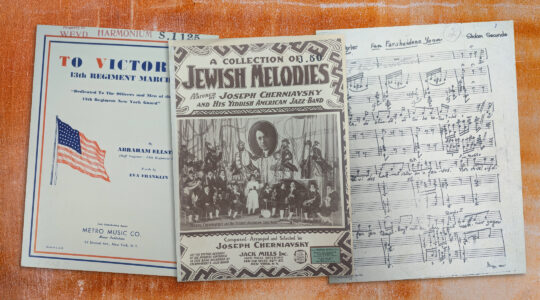On the 1900 block of Coney Island Avenue, a major business thoroughfare in the heart of Brooklyn’s heavily Orthodox Flatbush neighborhood, you could easily buy some kosher sushi or a few tractates of the Talmud.
Soon, the neighborhood’s residents will also have the opportunity to study the New Testament there and attend Jewish-style worship services that recognize Jesus as the Messiah.
Nearly two years after Chosen People Ministries, a prominent “Messianic Jewish” organization that presents Christianity as a fulfillment of Torah prophecies, opened a small educational center seven blocks away on East 18th Street, Chosen People is about to convert the site of a defunct Jewish funeral home into a Messianic seminary.
The future site of the Brooklyn Messianic Center and the Charles Feinberg Center for Messianic Jewish Studies (affiliated with the Talbot School of Theology, a Protestant institution in La Mirada, Calif.) will represent the largest presence of such a Hebrew-Christian group in an Orthodox neighborhood in the United States.
While the smaller center proselytized mostly to elderly Russians with little Jewish knowledge, the new center is expected to target Jews with the most intensive Jewish background. A particular target, experts say, will be at-risk Orthodox teens.
The converted building at 1978 Coney Island Avenue, which this week bore no signs of its future identity, will be a new, higher-profile front in so-called Messianic Judaism’s effort to establish itself as an accepted part of mainstream Judaism, anti-missionary experts say.
Chosen Ministries’ new beachhead in the heart of Orthodox Brooklyn sends “a powerful message,” said Rabbi Craig Miller, co-director of the Jewish Community Relations Council’s Spiritual Deception Project, which combats cults and missionary groups.
And counter-missionaries like Rabbi Miller and others are warning that area residents are not taking the new outreach seriously enough. “A lot of people [in the Orthodox community] aren’t aware of what this really means,” the rabbi said.
Moshe Verschleisser, another anti-missionary activist, agreed.
“One of their goals is to give the impression that they’re a legitimate Jewish movement,” said Verschleisser, who works with the Jews for Judaism organization. “I think we should be very much concerned. This is a big deal.”
Chosen People Ministries was the sponsor of this summer’s Isaiah53 campaign here, which — in billboards, subway ads and a Facebook page — promoted its interpretation of selected biblical verses.
“So far,” the Chosen People website boasts, “this campaign has resulted in more contacts with Jewish seekers than we have had in decades!”
Support the New York Jewish Week
Our nonprofit newsroom depends on readers like you. Make a donation now to support independent Jewish journalism in New York.
Initiatives like Isaiah53 and the Messianic Center in Flatbush are putting Chosen People Ministries, which was established in 1894 in the Brownsville section of Brooklyn and was formerly called the American Board of Missions to the Jews, at the forefront of Hebrew Christian organizations, the best-known of which is Jews for Jesus.
Messianic Jews claim to have tens of thousands of adherents worldwide, although counter-missionaries say these groups represent only a handful of people.
The new Chosen People center will aim its message at the overall Orthodox community, an expansion of its current focus on émigrés with weak Jewish backgrounds.
Few leaders or members of Flatbush’s Orthodox community have taken steps to oppose the center or warn local residents about an impending missionary threat, Rabbi Miller and other activists said. Most Orthodox Jews, they said, are accustomed to seeing such Hebrew Christian groups (a term the Messianics themselves avoid using) setting up modest houses of worship and schools in Orthodox areas; Orthodox Jews in an Orthodox milieu are usually considered invulnerable to missionary ploys.
“We’re just used to it,” said Shalom Diamond, an Orthodox resident of the neighborhood who left Khal Ohev Tzedek, the small chasidic synagogue next to the Chosen People educational center on East 18th Street, following morning services early this week.
Diamond said fellow members of his minyan have taken a “live and let live” attitude to the missionary building, which clearly identifies itself in English and Russian.
“It’s like ‘The Mosque,’” he said, alluding to the planned Islamic center near Ground Zero that has drawn much public opposition in recent weeks — in other words, the Chosen People center is an annoyance, it’s offensive, but it probably isn’t a danger.
“We basically ignore them” at our peril, said Rabbi Moshe Shulman, executive director of Judaism’s Answer, an anti-missionary group. “Until now, they have been totally unsuccessful,” bringing few Jews from traditional backgrounds into their fold, Rabbi Shulman said.
Such missionary groups have developed more sophisticated outreach methods, beyond street-corner pamphleteering and sermonizing, and now feel more confident of making inroads into the Orthodox community, Rabbi Shulman said.
Someone from an Orthodox background who accepts the Messianic brand of Christianity is considered a prime snare, for the “symbolic value,” he said. “They’re not looking for huge numbers — [only] one or two people from that community.”
“They start by looking to weaker people,” typically to members of dysfunctional families. “They look for those who are most vulnerable among the Orthodox.”
Rabbi Miller said JCRC, which has monitored the work of Chosen People Ministries and similar groups for several years, says the Council has worked with anti-missionary activists and community organizations in Flatbush since Chosen People’s plans to convert the former Yablokoff Kingsway Memorial Chapel became known last year, but has no plans now for a citywide campaign to oppose the Messianic center.
Support the New York Jewish Week
Our nonprofit newsroom depends on readers like you. Make a donation now to support independent Jewish journalism in New York.
“We’re still at an information-gathering stage,” he said.
The Chosen People building “will be the first accredited evangelical seminary in Brooklyn in recent years,” the current edition of Christianity Today, which announced the purchase of the 11,000-square-foot site, reported. “Once rehabbed, the building will allow the organization to provide substance-abuse counseling and to teach English as a second language. It will house a library for Messianic research and a 150-seat sanctuary.”
No date for the opening of the center is set, a Chosen People spokesman said this week, adding that Chosen People’s national headquarters will remain in Manhattan.
Questions about other details of the center’s operations were sent this week to Mitch Glaser, the Jewish-born president of the organization. But a spokesman said he would not be available for comment until November.
“The asking price for the facility is $2.1 million,” according to the June 2010 edition of the Chosen People bulletin. An essay by Glaser, entitled “Back To Brooklyn,” stated that, “the Lord is using us to bring the message of eternal life to our Jewish people.
“I hope you and your family and even your church will consider giving generously and sacrificially to help us reach the 750,000 Jewish people in Brooklyn,” Glaser wrote.
The organization’s “Brooklyn Messianic Center” on East 18th Street, which was established about one and a half years ago on the second floor of a two-story brick home, serves to “test the waters,” to gauge the reactions to a Messianic organization in a haredi area, said Verschleisser, the anti-missionary activist who lives a few blocks away.
The small-scale Chosen People center, which concentrates its outreach to elderly Jews and members of the Russian émigré community, has attracted only a handful of Jewish people to its worship services and has drawn no opposition in the community, Verschleisser said.
“The local community has been distressingly quiet about it,” he said. “Most Jews don’t see it as a threat.”
The New York Jewish Week brings you the stories behind the headlines, keeping you connected to Jewish life in New York. Help sustain the reporting you trust by donating today.




